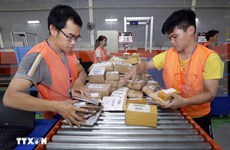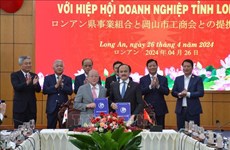Auto industry suffers from structural weaknesses
Vietnam's auto industry has survived its first decade, but had
failed to live up to expectations because of a limited market, supply
industries and roading, an expert has said.
Vietnam's auto industry has survived its first decade, but had
failed to live up to expectations because of a limited market, supply
industries and roading, an expert has said.
" Vietnam is a developing market with a very limited size, but it has 11 joint venture companies with a production capacity of just thousands of vehicles per year. How can it be effective?" senior independent economic commentator Pham Chi Lan said.
As a result, domestic vehicle makers like Vinaxuki and Truong Hai Auto struggled to compete against foreign enterprises who had more advantages, she said.
Ministry of Industry and Trade heavy industry department deputy Ngo Van Tru said the domestic auto consumption of just 100,000 vehicles with 400 models per year was hardly enough to support the industry.
Lan said countries like Japan and China had several auto producers, but they were able to create healthy competition and to meet demand.
The sluggish development of domestic auxiliary industries didn't help the situation. Carmakers had to import components and parts, which pushed up prices and made them less competitive.
Lan said most local carmakers did not trust the quality of components and parts made in Vietnam . Enterprises, on the other hand, considered it too risky to produce components and parts in Vietnam .
Hanoi Export Processing and Industrial Zone management board head Nguyen Xuan Chinh said one of main reasons auxiliary industries hadn't developed was that auxiliary enterprises and auto assembling companies did not trust each other.
A representative of Vinaxuki, who asked to remain anonymous, said: "Vinaxuki produces 40 percent of its own components and parts. We plan to raise that to 60 percent."
Meanwhile, another fact against the development of the car industry was the nation's poor roading.
Main roads in Hanoi and HCM City , for example, could adequately accommodate only 15 percent of all vehicles, instead of the standard 40-60 percent. The density of vehicles per kilometre in Hanoi was 6,500, including motorbikes.
The sources said authorities should give tax incentives to encourage domestic auto production by a certain deadline.
Economist Lan said: "Auxiliary enterprises should produce components and parts for many different vehicles, which would help them save production costs and human resources."
The Government should encourage local firms to produce autos which satisfied the demands of motorbikes and made the vehicles more competitive with foreign one, Lan said./.
" Vietnam is a developing market with a very limited size, but it has 11 joint venture companies with a production capacity of just thousands of vehicles per year. How can it be effective?" senior independent economic commentator Pham Chi Lan said.
As a result, domestic vehicle makers like Vinaxuki and Truong Hai Auto struggled to compete against foreign enterprises who had more advantages, she said.
Ministry of Industry and Trade heavy industry department deputy Ngo Van Tru said the domestic auto consumption of just 100,000 vehicles with 400 models per year was hardly enough to support the industry.
Lan said countries like Japan and China had several auto producers, but they were able to create healthy competition and to meet demand.
The sluggish development of domestic auxiliary industries didn't help the situation. Carmakers had to import components and parts, which pushed up prices and made them less competitive.
Lan said most local carmakers did not trust the quality of components and parts made in Vietnam . Enterprises, on the other hand, considered it too risky to produce components and parts in Vietnam .
Hanoi Export Processing and Industrial Zone management board head Nguyen Xuan Chinh said one of main reasons auxiliary industries hadn't developed was that auxiliary enterprises and auto assembling companies did not trust each other.
A representative of Vinaxuki, who asked to remain anonymous, said: "Vinaxuki produces 40 percent of its own components and parts. We plan to raise that to 60 percent."
Meanwhile, another fact against the development of the car industry was the nation's poor roading.
Main roads in Hanoi and HCM City , for example, could adequately accommodate only 15 percent of all vehicles, instead of the standard 40-60 percent. The density of vehicles per kilometre in Hanoi was 6,500, including motorbikes.
The sources said authorities should give tax incentives to encourage domestic auto production by a certain deadline.
Economist Lan said: "Auxiliary enterprises should produce components and parts for many different vehicles, which would help them save production costs and human resources."
The Government should encourage local firms to produce autos which satisfied the demands of motorbikes and made the vehicles more competitive with foreign one, Lan said./.












